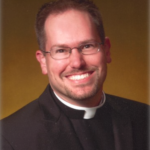4/28/2023
Herding Sheep — Not Such an Easy Task!
 Fr. Rich Andre, CSP
Fr. Rich Andre, CSP
April 28, 2023
 Fr. Rich Andre, CSP
Fr. Rich Andre, CSP
April 28, 2023
Our Hebrew ancestors were an earthy, practical people. They were familiar with sheep and shepherds in a way that eludes most of us today. Interestingly, Psalm 23 (“The LORD is my Shepherd”) only became popular in the United States around 1860, as our country was headed towards industrialization and civil war.
In 2001, I learned about sheep and shepherds when I spent a day on retreat at a sheep farm in Greene County, PA with the seminarians of the Diocese of Pittsburgh. I don’t know how much help we were to John and Joan, the couple who tended the sheep. But it was quite an experience!
The ancient Israelites lived when life was much more tenuous. There was no social safety net. Israel was a weak nation, living in the hope that its neighbors would not attack it. In many ways, shepherds were “on the clock” 24/7. If they did not protect the sheep every minute of the day and night, the sheep ran the risk of wandering off a cliff, being attacked by hostile animals, or being stolen by thieves. Our utter dependence on God, our utter trust in God – that is what all these sheep and shepherd analogies in the Bible are about.
Sheep aren’t very quick to get moving in the proper direction. But as I learned 22 years ago, you can’t really rush sheep along. When we chased the sheep, we discovered that sheep can run very fast, just not all of them in the same direction that you want them to go. When we, like sheep, go astray, we don’t always aimlessly wander away from God. Sometimes, we bolt!
And yes, shepherds really do give their sheep individual names. After the sheep had scattered, Joan invited us to call the sheep back. She told us the name of one of the sheep, and she advised us to call to it gently. We called, but the sheep didn’t move towards us. Then, Joan called the name of the sheep so softly, I didn’t think it could even hear her. Nevertheless, it immediately started walking back towards her! The sheep recognize the voice of the shepherd.
Jesus is the good shepherd. He gently guides us along the right path. He calls us by name to follow him. He does not push or prod. And according to Jesus’ claims in today’s gospel passage, we can recognize his voice.
In the ten months I’ve lived in Boston, many people have asked me how I heard Jesus inviting me to consider the priesthood. Today is not the day for me to share my story – as priesthood is just one of many ways that a person can be a pastoral leader – but let me offer two thoughts:
For 3,000 years, the sheep and shepherd symbolism speaks to our needs to trust in God. No matter where we journey – be it through the bleached and arid Palestinian desert, across the cold and windy Pennsylvania farmland, or in the gentle warmth and greenery of a Massachusetts springtime – we have the ability to hear God’s voice.